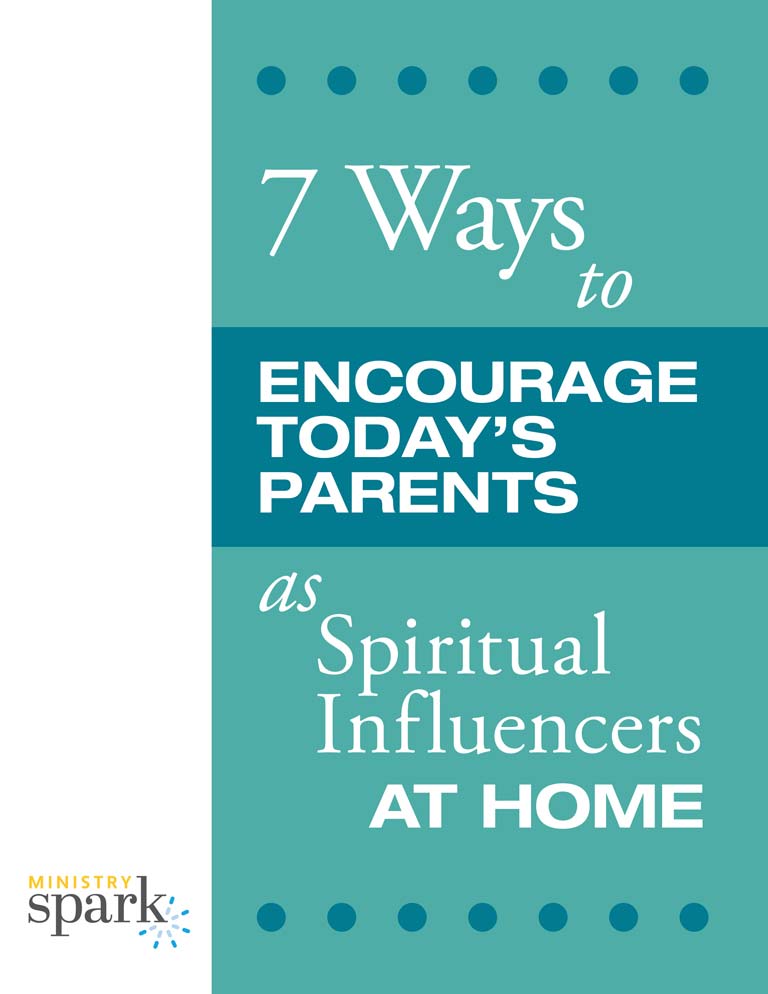We lose nothing by cheering on the home. We lose nothing—and we gain so much more.
We’re going to talk about partnering with the home. Full disclosure: I don’t have any biological kids, but I have been able to parent many, many kids. And it’s a blessing. On Mother’s Day, one of my kids who is 28 sent me a gift card and a note saying, “my life would look drastically different if it hadn’t been for you.” It made me cry—in fact all I’ve done is cry this week.
So, I’m not a biological parent, but I am a parent.
I have been in your shoes. I was a children’s pastor, and I was overseas working with kids for a while. I’ve done a lot of upper level leading down. But my big thing has always been making sure that I’m doing what I’m talking about. So, I purposely continue to work with kids because I love them.
You guys know that we get the best stories working with kids. I love being able to do that right now from where I live in Iowa. With being home more, I have been able to serve our teenagers and have a small group. In fact, if you’re on social media with me, you would have seen my small group of girls. I also direct an afterschool program that we started in January.
We thought, how can we serve our community?
Asking the Right Questions

I’m in the trenches with you, and I’m asking those same kinds of questions. How do we help the home partner with kids? How do we help the home understand that they need to be spiritually working with their kids? And how do we do that without dropping off a box full of resources or sending emails that are never opened?
There’s nothing worse than when you use MailChimp or MailerLite and you can see that only three people opened this beautiful email you put your heart and soul into. Or you put up a YouTube video and only 8 people viewed it for 2 minutes.
So, how do we do it?
It’s challenging. I wish I could say that, by the end of this, you’re going to have all the answers, but I can’t tell you that because it’s an ever-evolving thing. And honestly, I think the best thing we can do is learn from each other.
Join in with what God is doing.
One of the things we do too often in ministry is try to copy what someone else is doing because they’re getting good results. We think it’ll work for us, but that doesn’t work. The best thing you can do is figure out your context and how the idea works for you and your people.
All that to say, be careful of trying to do exactly what everyone else is doing. Thinking the ideas will play out the same exact way won’t work, and that’s because we’re all unique. And our church bodies are unique—as are our communities.
Biblical Role of the Church Community
We’re going to talk a little bit about what the biblical role of the church community is in relation to the home. I’m a pastor’s kid, and we lived in a parsonage. I was literally at the church all the time.
In that, I grew up understanding that the church had a very important role in my spiritual walk. One of the things that happened though the years—and then as I became a children’s pastor—is that I began to realize that I had put the church in a role it wasn’t meant to have.
One of the things that I was processing and wrestling with, even before the pandemic hit, was How do we celebrate the church, but not put the church in the role of the family? What does that look like?
I got all the angst and the feelings and the groanings that come with that.
Deuteronomy 6
When we look at the biblical role of the church, it kind of changes things. So, Deuteronomy 6 is a spot we go often. Talk about these truths to your kids as you’re on the road, as you’re putting them to bed, when they’re at the bus stop, etc.
It tells us to just do life and tell them God’s truths. Well, what we often do is we look at that and we tell parents Deuteronomy 6—you need to be doing this. But we often forget who the audience actually was. The audience was Israel.
Deuteronomy 6 is a call to the community of faith to pass on faith to the next generation. That means it takes all of us. And it takes all of us because the reality is the whole church is not tucking our kids into bed every night.
The partnership between the church and home is important. It takes a village, and the Hebraic community did life together.
Jesus at the Temple
If you remember the story of Jesus at the temple—which is how it’s titled—you’ll remember that’s when Mary and Joseph couldn’t find Jesus. (And if I were to title it, it’d be That Time the Parents Lost Jesus—because that’s really what happened. I mean, we put the good biblical spin on it, but really Joseph and Mary lost the Savior of the world.)
Anyways, in the story they can’t find Him. It takes a while for them to realize He’s gone. In Scripture it says they assumed He was with the company. So, here’s what happens. They assumed He was with the family—or the community. And they’re really not that worried because they did life together.
Well, then it got to the point where they really weren’t sure where He was because Aunt Susan hadn’t seen Him, and Uncle Joe didn’t know where He was either.
But my favorite part of the story is when they find Him in the temple. If you know Scripture, you know that Jesus can’t sin. Right? But he’s a preteen boy. And He says to them, “Didn’t you know I would be in My Father’s house?”
As His mom, I’d be like, “Get Your rear out of Your Father’s house because Your earthly father has a few words for You, young man.”
But the point of that story is that they assumed He would be with the faith community because they did life together.
The Beginning of Sunday School
And from that, we have morphed to this: The Sunday school movement came out of the 1800s and the Industrial Revolution when kids were working and didn’t go to school. They only had Sundays off. And really well-meaning people began to see these kids and want to help them learn. They learned all kinds of subjects to help them through life—including Scripture.
Eventually, it became Sunday school that we know it today. That’s kind of how the church began to take the place of the parents.
Psalm 78
Another Scripture I like to turn to is Psalm 78.
“We will not hide these truths from our children;
Psalm 78:4-7 (NLT)
we will tell the next generation
about the glorious deeds of the Lord,
about his power and his mighty wonders.
For he issued his laws to Jacob;
he gave his instructions to Israel.
He commanded our ancestors
to teach them to their children,
so the next generation might know them—
even the children not yet born—
and they in turn will teach their own children.
So each generation should set its hope anew on God,
not forgetting his glorious miracles
and obeying his commands”
It goes on to say in verse 11 that they forgot what He had done.
How does a whole generation forget what God has done? It’s when we stop telling the next generation what God has done. It’s when we forget to tell the next generation about the good deeds of the Lord. When we forget to talk about how we have seen God in our day and our week, when we forget to share the stories of God at work in our lives—that’s when a whole generation forgets.
We all need to pass on faith. We are all in this together. Even the crankiest man named Al, who hates kids, but comes to church because he loves Jesus, has a part to play in passing on faith to the next generation.
God Works Through Kids

What if God desires to use kids in the home before he uses the parents? This is not every home, but can you think of a family that started coming to church because their kids started asking questions about Jesus?
I continually forget that when I preach, that God moves through kids. I continually forget because there’s still this arrogant adult side of me. I forget that God’s in the business of using kids to do His work. He uses me too, but He uses kids.
We were created by God for God. There is this innate desire within every single one of us to know about God. So, because we were created by God for God, we want to know about Him.
And if you look throughout Scripture, God has always been in the business of using kids.
When the pandemic started, I was so burdened for my neighborhood because I have a lot of kids who are not in safe homes. I’m a doer, and my guess is that probably 80% of you reading this are doers because you don’t go into ministry to be passive. I asked the Lord what I should do. And I felt like He told me to start praying.
Pray
Our prayers are so much more powerful than we give them credit for.
And I just prayed. In fact, there’s one house right across the street where I know the kids aren’t safe. I started praying specifically for that house. And suddenly, one day one of the kids from that house shows up at my door. He asked if he could do some work for money, so by golly, I found things for him to do. I started buying him popsicles. He knew if he came over, he’d get a popsicle.
And I started feeding him because I knew he wasn’t getting fed. Well, then I would send things home. I became that crazy weirdo that you probably should tell your kids to stay away from. Pretty soon he shows up with his little sister. He then brought his other sister.
Then there was a day that I’ll never forget. He showed up with his giant-man-eating dog. It was 120 pounds. He goes, “This is my dog, Demon. He wanted to meet you.”
Power in Prayer
So, I want to encourage you. As you think about partnering with the home, do not underestimate the power of praying for these homes and for these kids. Your first and most important work should be praying. I am guilty of making it the last thing all the time. But you know what? God has continually blown me away as I prayed.
And I thought, how like God to bring a kid to my door when I couldn’t get to His.
Get those great saints in your church community praying. Give them a list, give them a street or a map of your town, and say, “I need you to pray over it.” Then follow up with how God’s answering those prayers. Otherwise, you get weary doing good.
Don’t become weary in doing good and don’t put parameters on what that “good” needs to look like.
I find most parents are not aware of their spiritual role in their kids’ lives. Even in well-meaning Christian families, parents don’t understand.
Educate Parents
After you’ve prayed, do a little bit of educating. I don’t want you to go buy them a book. They don’t want another book. I like to remind parents that they are a representation of God to their kids. When you hug your kids after they get hurt, you’re helping them understand that they can come to you when they’re hurt, and you’re showing them they can come to God when they’re hurt.
What if we go, did you know that by loving your kid, you’re helping them experience the love of Jesus? Did you know that that you’re influencing your kids spiritually without even meaning to—what if you did it on purpose? What would that look like? What if as you tuck them in at night, you’d say, “Let’s pray together, let’s thank Jesus for our day, or ask where you saw God at work today?“
This takes no time, but parents just don’t know. Give them some really practical ideas, simple things. You are not giving them a book and you’re not giving them curriculum. You are simply saying, “Hey tonight, Sarah, share with your child where you saw God at work today.” You can even teach parents how to bless their children.
Because the other thing we’re really good at is putting all the work on the kid. We’ve got to step up as the adults in their lives.
Working Together

There is a place for the church community. And there’s still a place for the family.
Do I understand how it all works? Not at all. But here’s what I do understand:
Take a kid out of the roughest, most awful possible thing. Light always shines brighter in the darkness. And you might think, but she was only with us for two hours this week. When you take two hours of light—as opposed to a week of darkness—you never forget the light.
Do not become weary in doing good. You can make a difference. We’re engaging the parents when we can, the family when we can, and we’re also loving these kids when we can.
Don’t Be Afraid of Change
I do our VBS every year. We have rough situations that kids face in our area every day. They deal with a lot. I looked at my team and told them that I was done focusing on things like verse memorization or how much money kids can bring for missions. I told my team that it was time to make changes.
Our priorities for VBS this year are that every kid who walks through the door of our church knows that they’re safe, and every kid who walks through the door of a church knows that they’re loved by us. And if they know they’re safe and they’re loved by us, guess what? We’ve just introduced them to a God who loves them unconditionally.
When you take two hours of light—as opposed to a week of darkness—you never forget the light.
I want you to put your hand on the shoulder of every single kid you encounter and say, I’m so glad you’re here. I’m so proud of you. I’m so glad you’re here. You are loved.
We are going to be the biggest cheerleaders of the home, and we’re going to love these kids to the best of our ability.
You Can Keep Doing Good
Don’t become weary in doing good, and don’t put parameters on what that “good” needs to look like. Don’t tell God what the good you’re doing needs to look like. Listen for Him to tell you what the good is that you should be doing. You lose nothing.
We lose nothing by cheering on the home. We lose nothing—and we gain so much more.
Join in with what God is doing. Start asking Him to reveal to you what you need to be doing. That means opening your hands and releasing control. If we’re going to remain relevant—if we’re going to remain partners in spiritual formation—it’s going to be through a posture of humility.
Keep at it. Spiritual formation happens in the home, in the church, and it also happens in our communities. And if you try to put it into a box, you’re going to miss out on what God is calling us to do.

Ready to help parents create an environment for spiritual growth?

Ready to help parents create an environment for spiritual growth?












